Publications by Alyssa Samek
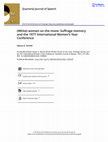
Quarterly Journal of Speech, 2020
This essay examines how the 1977 International Women's Year Conference (IWY), a historic gatherin... more This essay examines how the 1977 International Women's Year Conference (IWY), a historic gathering of women in Houston, Texas-tasked to put forward a series of policy recommendations, many informed by a feminist perspective-undercut its own intersectional impulse by leveraging collective memory of U.S. suffrage activism. I analyze the conference program, a document distributed to every conference attendee, that called up early woman's movement history and suffrage memory in its language, ephemera, and image to constitute a certain narrative for the 1977 IWY audience. I argue that by linking the IWY conference to a specific narrative of women's rights and suffrage activism, the planners made the conference more explicitly political and feminist, and imbued the event with historical significance and legitimacy. At the same time, the deployment of suffrage memory ultimately positioned white women as mobile and engaged in social movement while effacing Black women and women of color who had been involved in suffrage activism, thus rendering them immobile, invisible, silent, and locked in the past. I conclude by examining a concurrent counter-narrative, one not included in the program, as a productive, intersectional rupture in suffrage memory at IWY.
Quarterly Journal of Speech , 2017
This essay examines the 1977 International Women's Year torch relay from Seneca Falls to Houston ... more This essay examines the 1977 International Women's Year torch relay from Seneca Falls to Houston to demonstrate the rhetoricity of mobility and theorize running as a mode of public address. The relay used the velocity of running to centralize athleticism and the female athlete as a crucial site for liberal feminist citizenship claims in 1977 in the context of Title IX and the struggle over the Equal Rights Amendment. The runners' movement through space and place advanced a discursive performance of citizenship as they traversed the South. This analysis reveals mobility as a theoretical framework for rhetorical scholars interested in space, place, citizenship, and social movement.
This essay examines 1970s lesbian-feminist identity rhetorics to
interrogate the exclusionary log... more This essay examines 1970s lesbian-feminist identity rhetorics to
interrogate the exclusionary logics of visibility and gender normativity. Lesbian-feminists used such logics to exclude women living “in the closet,” performing gender in nonnormative ways, or avowing a transgender identity. Those struggles form a dynamic context to situate and critically analyze Robin Morgan’s keynote address at the 1973 West Coast Lesbian Conference, “Lesbianism and Feminism: Synonyms or Contradictions?” Though Morgan’s address exemplifies rhetorical violence of identity politics and transphobia within lesbian-feminist communities, I explore its radically queer possibilities to shed fresh light on persistent struggles that shape contemporary queer politics.

This essay employs a coalitional perspective to revisit the Radicalesbians’ 1970 manifesto, “The ... more This essay employs a coalitional perspective to revisit the Radicalesbians’ 1970 manifesto, “The Woman Identified Woman,” and to examine the circulation of its constitutive rhetoric of woman-identification within lesbian-feminist activist communities during the 1970s. I argue that lesbian-feminists utilized a pivoting strategy, a horizontal mode of working the space between identities, to leverage coalitional relationships and the woman identified woman as resources to craft alternative identity constructions that resisted woman-identification, challenged interlocking oppressions, and increased lesbian visibility within those respective communities. This analysis centralizes dynamic movement relationships and loyalties to approach the established narrative about lesbian-feminists in women's liberation from a new perspective and reexamine the constitutive rhetoric of woman-identification. Revisiting lesbian-feminist rhetoric brings the voices from an important archive to bear on feminist and queer history while centralizing coalitional relationships, offering a fruitful perspective from which to analyze social movement rhetoric and reexamine an important artifact in the feminist rhetorical canon.
This article analyzes the process of queering the academy by focusing on the politics and praxis ... more This article analyzes the process of queering the academy by focusing on the politics and praxis that constitute sexuality's role(s) in academic spaces. We advance our critique through a dialogue to centralize our own identities as we interrogate the treatment of the queer project within the academy. Our analysis reveals a contradiction that hamstrings the advancement of queer rhetorical work in the very locus that should bring new life to the discipline: the graduate classroom.
In her first recorded public speech to the utopian community of New Harmony, Indiana on July 4, 1... more In her first recorded public speech to the utopian community of New Harmony, Indiana on July 4, 1828, Frances (Fanny) Wright used the occasion to articulate an inclusive brand of citizenship and utilized the meaning of the Fourth of July to promote her reform ideology. In doing so, she upheld a transcendent patriot and ideal citizen of humanity, dedicated to enacting the ideals of the Declaration of Independence, as the hero of the occasion.
Communication Quarterly, 2011
This essay examines the public memorial for the late Senator Paul Wellstone arguing that it is a ... more This essay examines the public memorial for the late Senator Paul Wellstone arguing that it is a site of contestation over standards of political propriety. Assessing the Wellstone memorial as a complex rhetorical text, the authors contend that within the experiential landscape of the memorial, discourses that were alternately secular, political, sacred, and ceremonial clashed, violating the generic tenets of eulogistic discourse and casting the memorial as an impious civic event. This unresolved dissonance between politics and piety allowed Wellstone's Republican opposition to strategically deploy a rhetoric of political propriety, triggering a backlash that ultimately fostered Republican campaign goals.
Book Reviews by Alyssa Samek
pp. $44.95 (cloth and ebook).
QED: A Journal in GLBTQ Worldmaking, 2015
Papers by Alyssa Samek
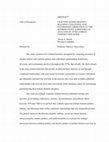
This study examines how lesbian-feminists navigated the competing pressures of identity politics ... more This study examines how lesbian-feminists navigated the competing pressures of identity politics and coalition politics and confronted compounding frustrations, divisions, and exclusionary practices throughout the 1970s. Specifically, the study attends to the ways lesbian-feminists rhetorically recalibrated their identities in and through coalitional relationships with such social movement communities as women's liberation, gay liberation, and anti-war activism. In the process, they were able to build coalitional relationships with activists from other movements while retaining a space for articulating and bolstering their lesbian-feminist identities. This study accordingly examines lesbian-feminist published writings and speeches given during conferences, marches, demonstrations, and political rallies between 1970 and 1980 to reveal how they crafted a space for lesbian-feminist politics, identity, and liberation from within coalitional relationships that also marginalized them. The project intersects the theories of public address, social movement rhetoric, intersectionality, identity politics, and coalition politics to examine the strategic interaction between coalition politics and identity politics in lesbian-feminist activism. In
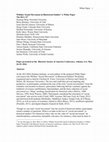
At the 2015 RSA Summer Institute, several authors of the proposed White Paper convened at the Whi... more At the 2015 RSA Summer Institute, several authors of the proposed White Paper convened at the Whither “Social Movement” in Rhetorical Studies? Workshop (organized and co-lead by Christina R. Foust, University of Denver and Charles E. Morris, III, Syracuse University). The two and a half days proved inspiring and productive, as participants considered the loss of the term “social movement(s)” from the scholarly conversation in rhetoric, particularly following McGee’s polemic against the traditions of resource mobilization, functionalism, and the basic reduction of social movement to a “thing” awaiting classification by rhetorical critics (McGee, 1980; DeLuca, 1999; Enck-Wanzer, 2006). Participants considered the relocation of “social movement” into activist work (Cloud, 2009; Aseynas, McCann, Feyh, & Cloud, 2012) and rhetorical field methods (McHendry, Middleton, Endres, Senda-Cook, & O’Byrne, 2014), as well as tactics of resistance related to affect (Bruce, 2015), neoliberal capitalism (Pezzullo, 2011), and digital ubiquity (Ganesh & Stohl, 2013).
Though we can read “social movement” into the record of rhetorical studies, participants raised a number of questions: What is at stake in the loss of “social movement” in rhetorical studies? For rhetorical critics who see the value of “social movement” (in interdisciplinary connections and public relevance, for instance), what must be done to rehabilitate the term? More particularly, what is the relationship between social movement as a phenomenon, noun, or “thing” and others’ treatments of social movement as a verb, process, or indicative of meaning change? How might reclaiming “social movement” for rhetorical studies invigorate work across different disciplinary domains, and the public? This white paper is the product of conversations provoked by these questions.
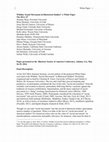
At the 2015 RSA Summer Institute, several authors of this White Paper convened at the Whither “So... more At the 2015 RSA Summer Institute, several authors of this White Paper convened at the Whither “Social Movement” in Rhetorical Studies? Workshop (organized and co-lead by Christina R. Foust, University of Denver and Charles E. Morris, III, Syracuse University). This white paper, collectively authored by The RSA 15, asks relevant questions to the study of social movements: What is at stake in the loss of “social movement” in rhetorical studies? For rhetorical critics who see the value of “social movement” (in interdisciplinary connections and public relevance, for instance), what must be done to rehabilitate the term? More particularly, what is the relationship between social movement as a phenomenon, noun, or “thing” and others’ treatments of social movement as a verb, process, or indicative of meaning change? How might reclaiming “social movement” for rhetorical studies invigorate work across different disciplinary domains, and the public?
The RSA 15:
Suzanne Berg, Newman University
Betsy Brunner, University of Utah
Josue David Cisneros, University of Illinois
Doug Cloud, Colorado State University
Michael Eisenstadt, University of Kansas
Kelly Jakes, Wayne State University
Michelle Kearl, IUPU-FW
Dominic Manthey, Pennsylvania State University
Jade Olson, University of Maryland
Milene Ortega, Georgia State University
Erin J. Rand, Syracuse University
Alyssa Samek, California State University Fullerton
Jessica Shumake, University of Arizona
Ian Summers, University of Utah
Justine Wells, University of South Carolina
To cite this paper in APA: RSA 15 (2016). Whither Social Movement in Rhetorical Studies? A White Paper. Presented at the Rhetoric Society of America conference, Atlanta, GA, May 26-29, 2016. For inquiries, please contact Christina Foust (cfoust@du.edu)
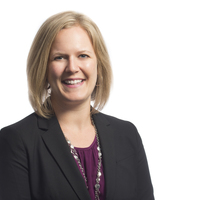
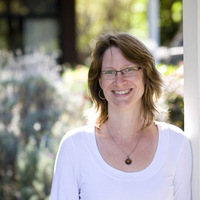





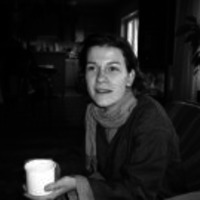


Uploads
Publications by Alyssa Samek
interrogate the exclusionary logics of visibility and gender normativity. Lesbian-feminists used such logics to exclude women living “in the closet,” performing gender in nonnormative ways, or avowing a transgender identity. Those struggles form a dynamic context to situate and critically analyze Robin Morgan’s keynote address at the 1973 West Coast Lesbian Conference, “Lesbianism and Feminism: Synonyms or Contradictions?” Though Morgan’s address exemplifies rhetorical violence of identity politics and transphobia within lesbian-feminist communities, I explore its radically queer possibilities to shed fresh light on persistent struggles that shape contemporary queer politics.
Book Reviews by Alyssa Samek
Papers by Alyssa Samek
Though we can read “social movement” into the record of rhetorical studies, participants raised a number of questions: What is at stake in the loss of “social movement” in rhetorical studies? For rhetorical critics who see the value of “social movement” (in interdisciplinary connections and public relevance, for instance), what must be done to rehabilitate the term? More particularly, what is the relationship between social movement as a phenomenon, noun, or “thing” and others’ treatments of social movement as a verb, process, or indicative of meaning change? How might reclaiming “social movement” for rhetorical studies invigorate work across different disciplinary domains, and the public? This white paper is the product of conversations provoked by these questions.
The RSA 15:
Suzanne Berg, Newman University
Betsy Brunner, University of Utah
Josue David Cisneros, University of Illinois
Doug Cloud, Colorado State University
Michael Eisenstadt, University of Kansas
Kelly Jakes, Wayne State University
Michelle Kearl, IUPU-FW
Dominic Manthey, Pennsylvania State University
Jade Olson, University of Maryland
Milene Ortega, Georgia State University
Erin J. Rand, Syracuse University
Alyssa Samek, California State University Fullerton
Jessica Shumake, University of Arizona
Ian Summers, University of Utah
Justine Wells, University of South Carolina
To cite this paper in APA: RSA 15 (2016). Whither Social Movement in Rhetorical Studies? A White Paper. Presented at the Rhetoric Society of America conference, Atlanta, GA, May 26-29, 2016. For inquiries, please contact Christina Foust (cfoust@du.edu)
interrogate the exclusionary logics of visibility and gender normativity. Lesbian-feminists used such logics to exclude women living “in the closet,” performing gender in nonnormative ways, or avowing a transgender identity. Those struggles form a dynamic context to situate and critically analyze Robin Morgan’s keynote address at the 1973 West Coast Lesbian Conference, “Lesbianism and Feminism: Synonyms or Contradictions?” Though Morgan’s address exemplifies rhetorical violence of identity politics and transphobia within lesbian-feminist communities, I explore its radically queer possibilities to shed fresh light on persistent struggles that shape contemporary queer politics.
Though we can read “social movement” into the record of rhetorical studies, participants raised a number of questions: What is at stake in the loss of “social movement” in rhetorical studies? For rhetorical critics who see the value of “social movement” (in interdisciplinary connections and public relevance, for instance), what must be done to rehabilitate the term? More particularly, what is the relationship between social movement as a phenomenon, noun, or “thing” and others’ treatments of social movement as a verb, process, or indicative of meaning change? How might reclaiming “social movement” for rhetorical studies invigorate work across different disciplinary domains, and the public? This white paper is the product of conversations provoked by these questions.
The RSA 15:
Suzanne Berg, Newman University
Betsy Brunner, University of Utah
Josue David Cisneros, University of Illinois
Doug Cloud, Colorado State University
Michael Eisenstadt, University of Kansas
Kelly Jakes, Wayne State University
Michelle Kearl, IUPU-FW
Dominic Manthey, Pennsylvania State University
Jade Olson, University of Maryland
Milene Ortega, Georgia State University
Erin J. Rand, Syracuse University
Alyssa Samek, California State University Fullerton
Jessica Shumake, University of Arizona
Ian Summers, University of Utah
Justine Wells, University of South Carolina
To cite this paper in APA: RSA 15 (2016). Whither Social Movement in Rhetorical Studies? A White Paper. Presented at the Rhetoric Society of America conference, Atlanta, GA, May 26-29, 2016. For inquiries, please contact Christina Foust (cfoust@du.edu)